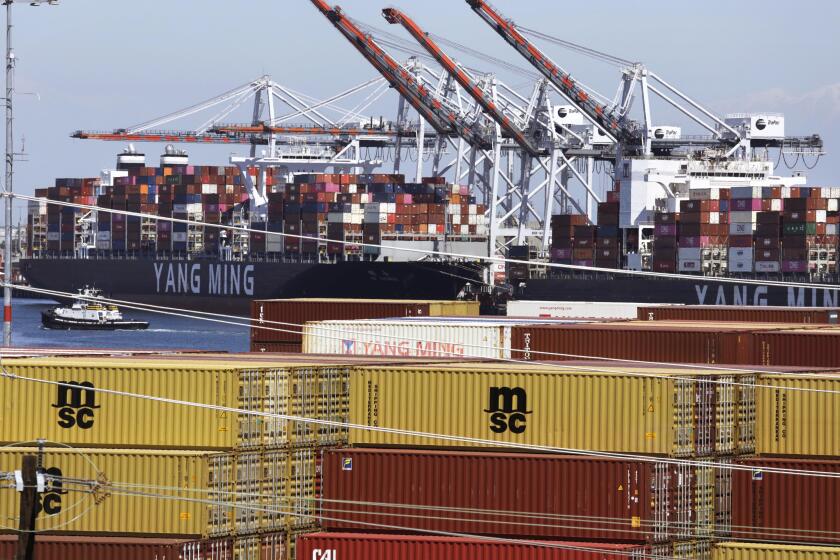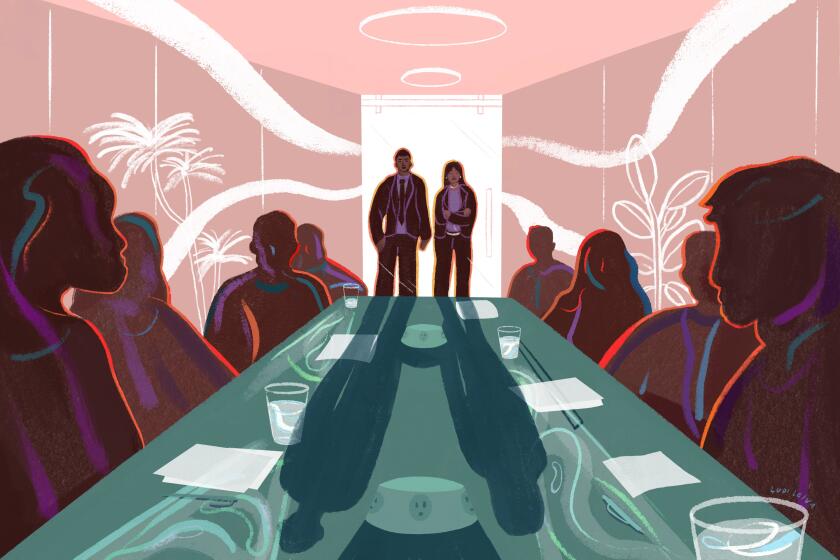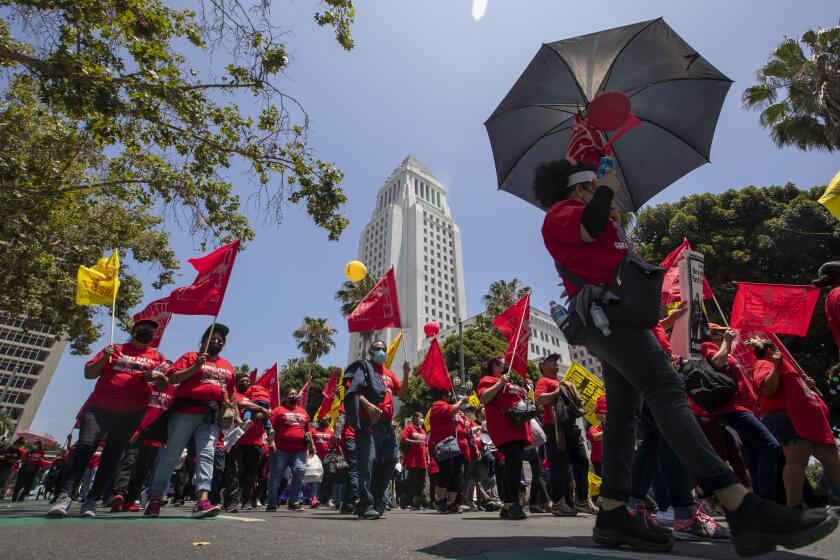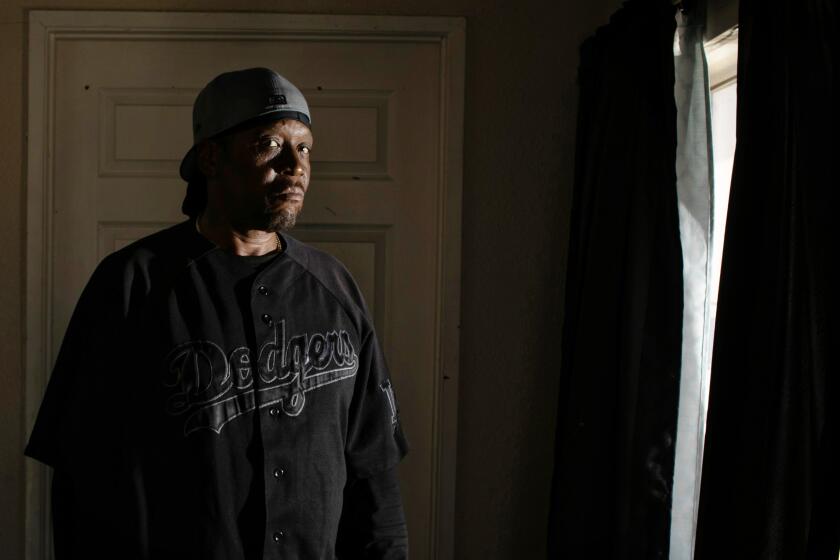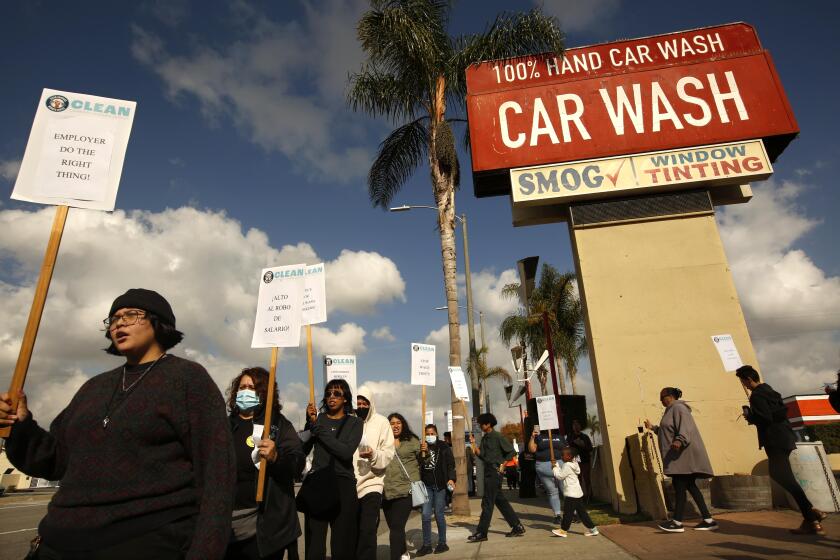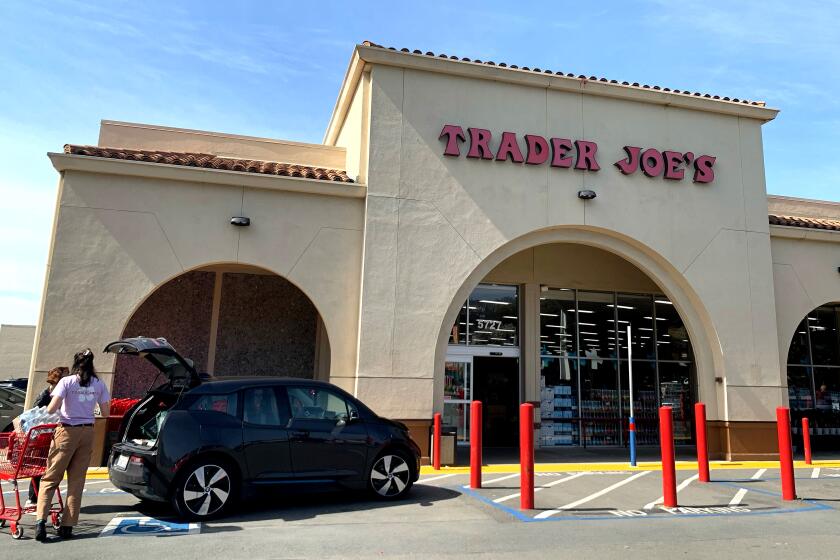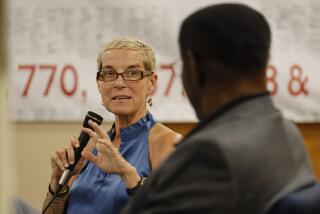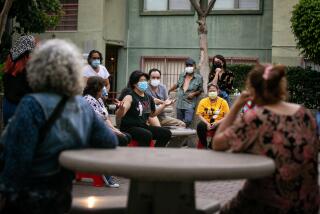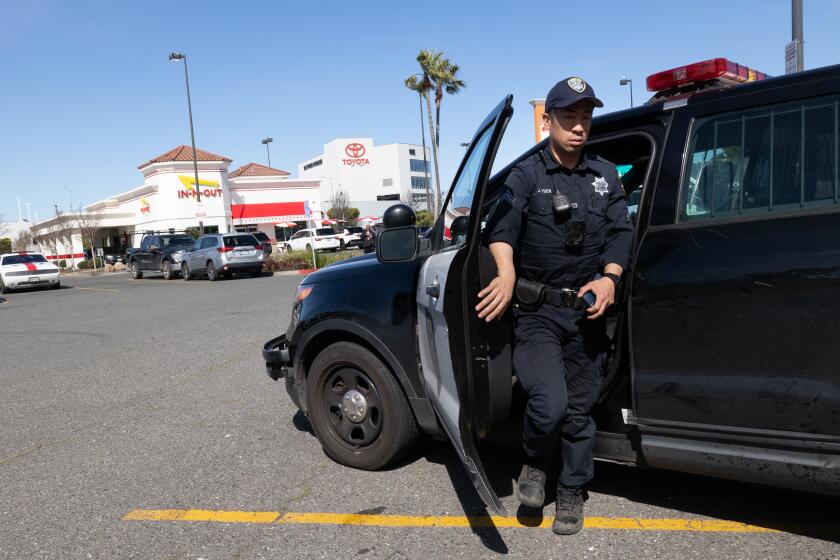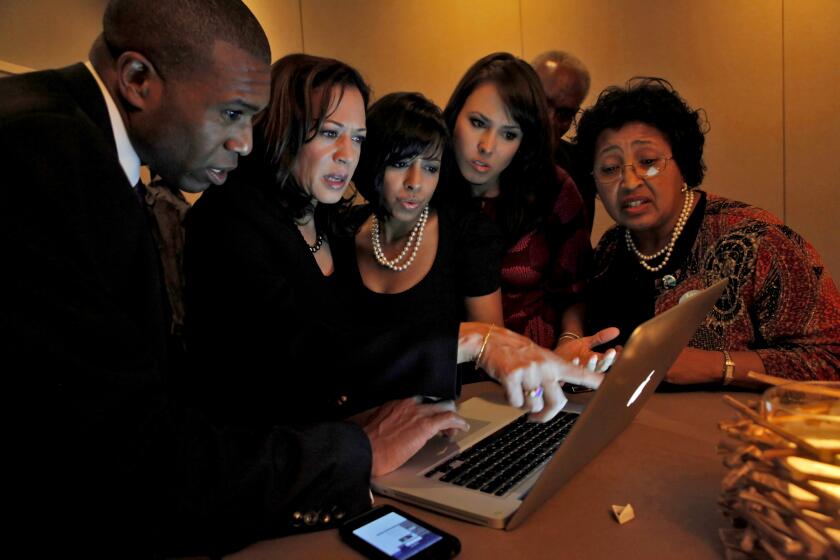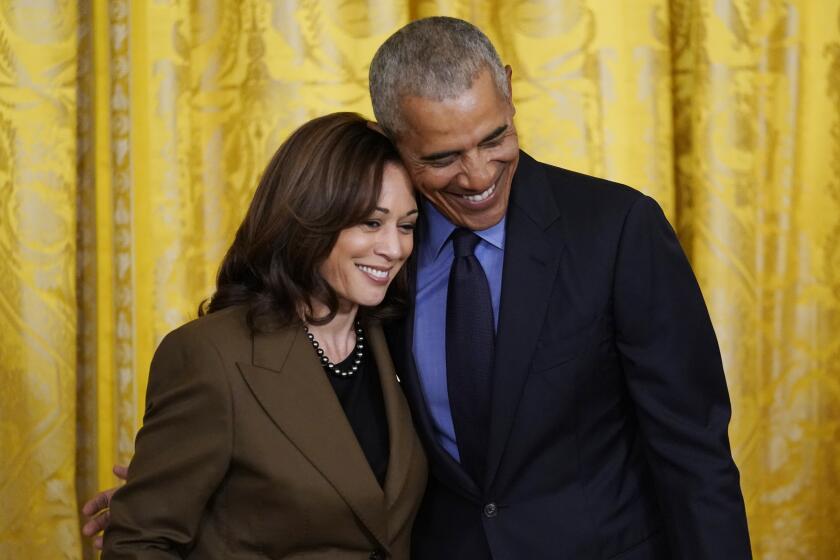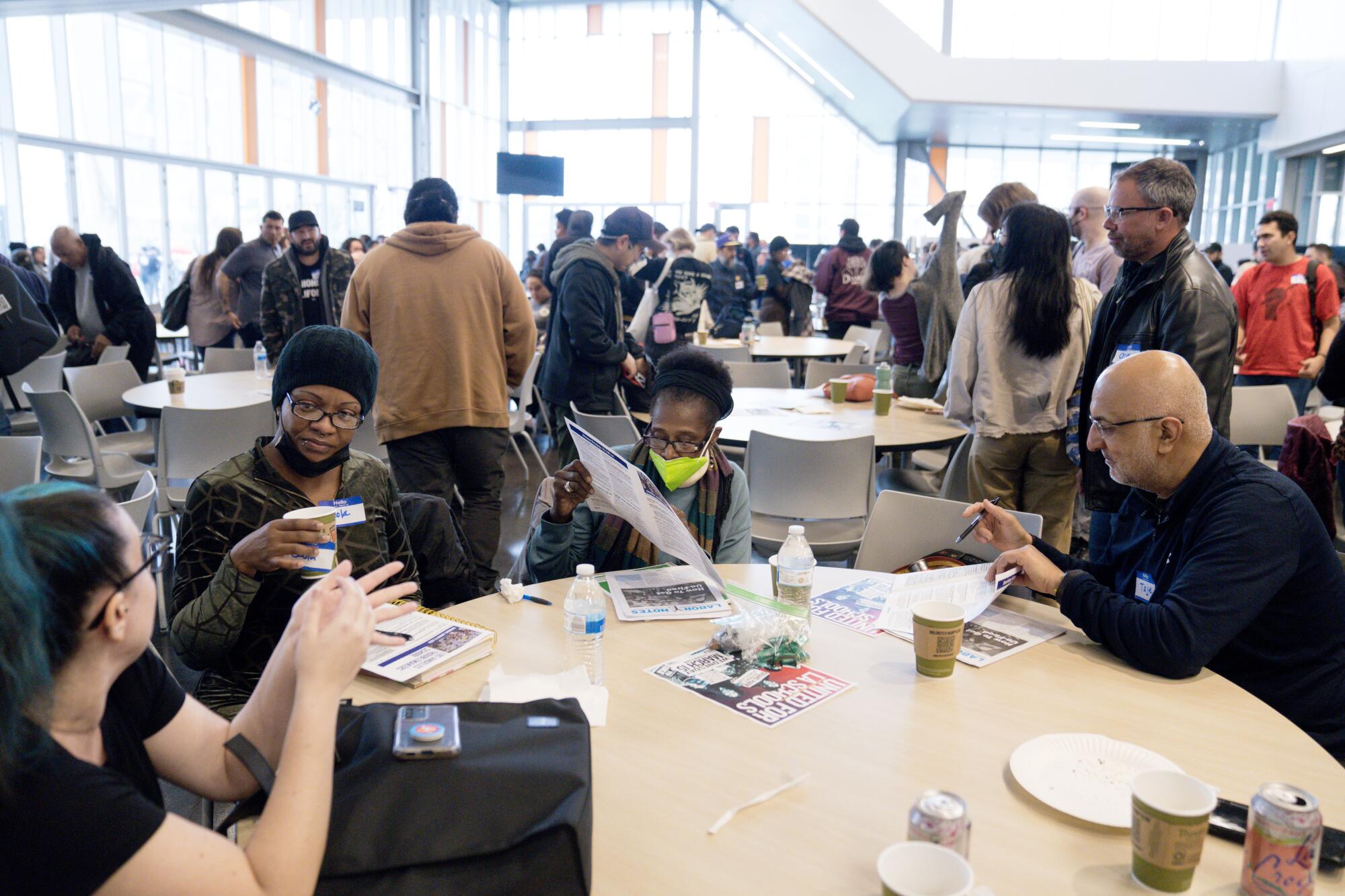
There were buttons: “Eat the Rich” and “We Want Bread and Roses Too.”
There were T-shirts: “Fight the Boss, Build the Union,” depicting a muscular woman wielding a slingshot.
There were books: “Democracy is Power” and “Secrets of a Successful Organizer” in English and Spanish.
And there were more than 400 activists pouring onto the campus of Los Angeles Trade-Technical College for a daylong “Troublemakers School,” put on by Labor Notes, a Detroit-based nonprofit that is a key player in labor’s progressive wing.
It was standing-room-only in the downtown Los Angeles workshops, including “Bargaining Basics,” “Building Solidarity and Power in the Logistics Chain” and “What to Do When Your Union Breaks Your Heart.”
A dockworker shortage at the ports of Los Angeles and Long Beach ended Friday night after halting cargo traffic at the complex.
Among the attendees were hotel housekeepers, longshoremen, university researchers, warehouse forklift drivers, nurses and construction workers. And there were workers from rarely unionized businesses: baristas, video game developers and Hollywood animation staffers.

Whether they were long-term union members or would-be organizers, they shared a similar goal: to energize the struggling labor movement.
One was an electrician whose father resisted her plan to follow him into the trade. One was a stripper seeking a safer workplace, and yet another was a Starbucks barista appalled by irregular hours and low pay at the coffee chain.
On hand to share tactics: members of the Teamsters and United Auto Workers — unions whose upstart reformers have ousted national leaders deemed insufficiently aggressive.
Over decades, U.S. union membership plummeted to 10.1% of the workforce, as laws protecting organizers remained weak, companies moved factories to politically conservative states or abroad, and big employers such as Amazon and Starbucks deployed aggressive tactics to stifle collective bargaining.
Even in labor-friendly California, union membership fell to 16.1% of employees last year from 17.8% in 2002.
But as wages have stagnated over decades, polls show a sharp rise in Americans’ positive view of unions — to 71% approval, the highest rate since 1965, according to Gallup.
Latinos are the nation’s largest ethnic or racial minority with 18.9% of the population, yet few ascend to the pinnacle of U.S. corporate power: board member.
The electrician

Venessa Ingalls listened raptly, taking notes in the “Secrets of a Successful Organizer” class, her young daughter, Hailey, on her lap. Ingalls’ union is the 700,000-member International Brotherhood of Electrical Workers, but in her spare time, she founded an organization called Tradeswomen Sisterhood.
A daughter and granddaughter of IBEW journeymen, Ingalls told her father soon after high school that she wanted to apprentice. At the time, just five of some 500 members at his Riverside local were women.
“The first words out of his mouth were ‘F— no!’” she recalled.
A year later, he relented.
Ingalls, now 34, worked at construction sites as a skilled electrician for 15 years. Today, she is a staff organizer at Local 440.
But even as the local has grown to 1,400 members, only about 15 are women, she said. “Women can do the work, but they don’t know about the apprenticeships.” Her sisterhood group is an outreach and mentorship network.
As an organizer, Ingalls uses Labor Notes guidebooks and worksheets to energize her colleagues and mobilize politically. “We’re trying to change the dynamic — to go from apathy to activism,” she said.
Why are unions losing power? Because they sign contracts forbidding strikes, and labor leaders are in a “partnership, we-can-all-get-along mind-set” with company managers, as she sees it.
“I’m sorry, we’re not friends,” Ingalls said. “That’s not how it works.”
Among California’s new workplace laws are ones expanding family leave, providing bereavement leave and mandating pay transparency. But many more measures tagged “job killers” failed.
The stripper
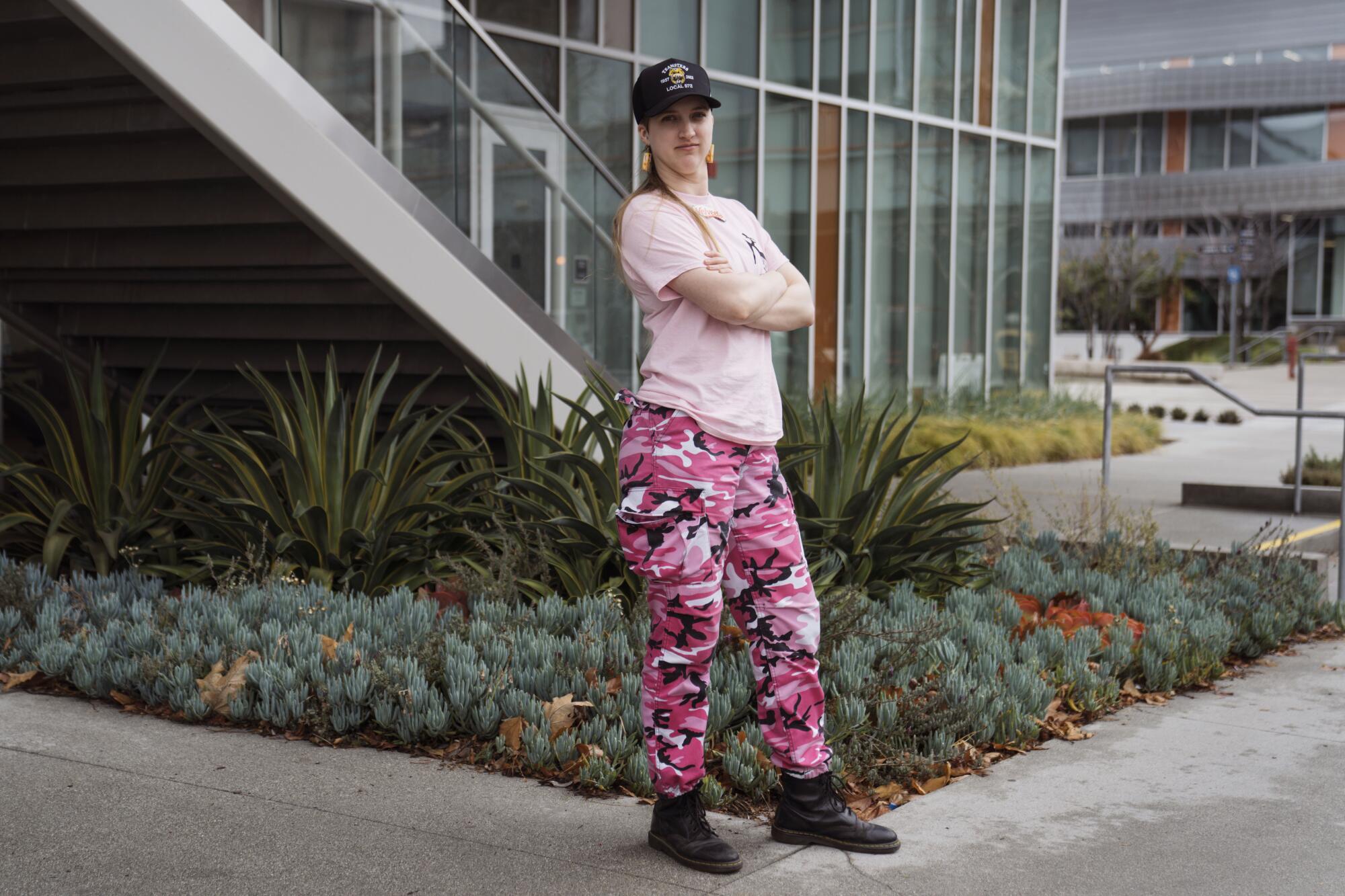
A philosophy major at Rice University, Heather Olson moved to Los Angeles after graduation, hoping for a film industry job. To support herself, she danced at a strip club under the stage name “Velveeta.”
In March 2022, when Olson and her co-workers at North Hollywood’s Star Garden Topless Dive Bar petitioned its owners for protection from customers’ aggressive behavior, they were locked out.
The dancers mobilized to form a union, Strippers United. They picketed outside the club for months in elaborate costumes, attracting media attention and Instagram livestream followers. “Twerk Union,” read one sign.
Members of the Teamsters, Actors Equity and Unite Here joined the protests.
“Dancing and making costumes was a creative outlet, but now I’m more interested in labor organizing,” Olson said, as she headed into a panel at the Troublemakers School.
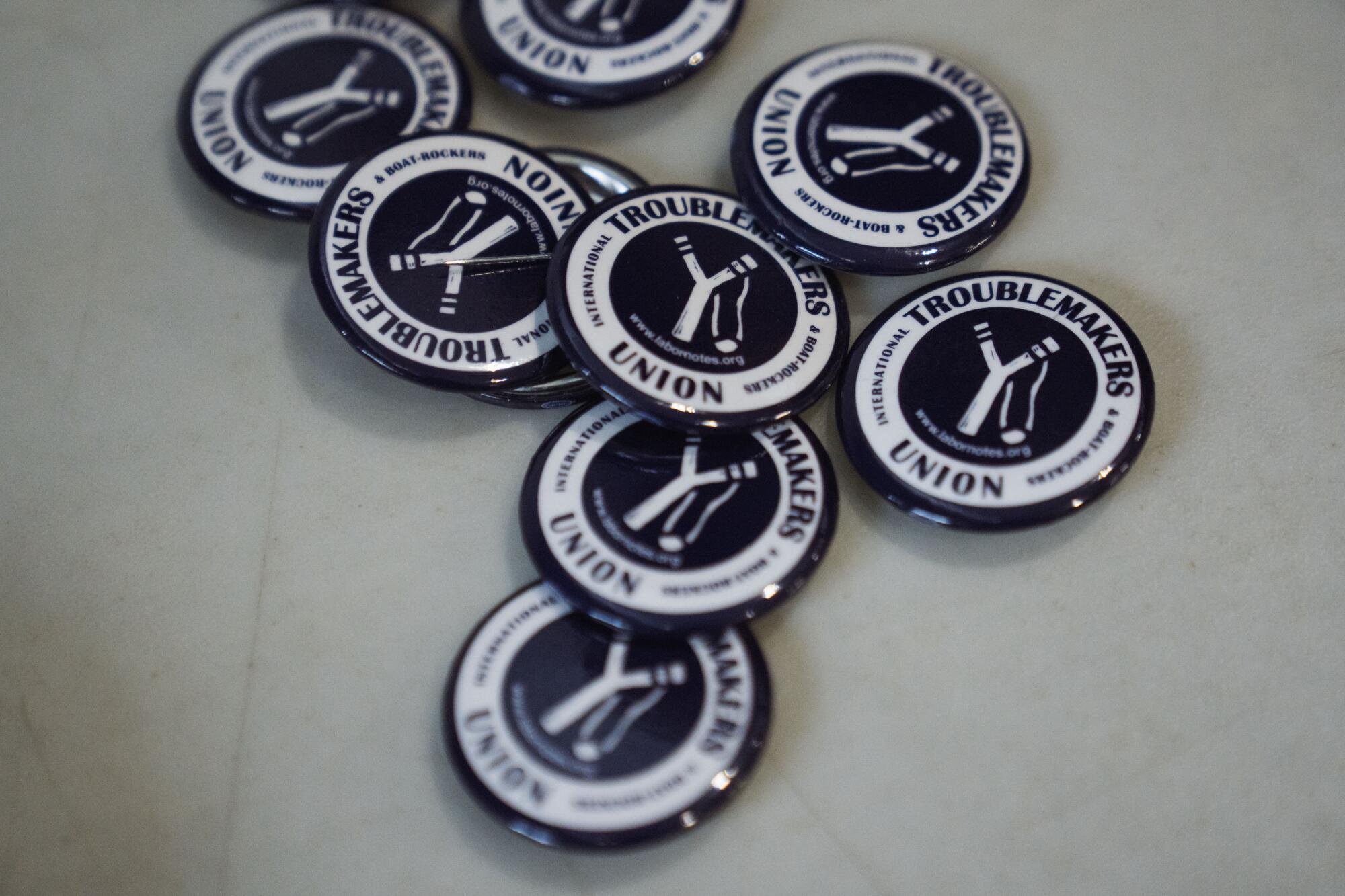
Dressed in a pink T-shirt adorned with a spiked high heel atop the word “union,” the 31-year-old planned to network with other attendees: “It feels like we’re part of a new wave,” she said.
In August, Actors Equity, a century-old union, announced that it would help the strippers organize. Then in December, the National Labor Relations Board announced that Star Garden had “unlawfully retaliated” against the dancers who “raised concerns about their health and safety.”
But with the club asserting that the strippers were independent contractors — and therefore ineligible to unionize — the organizing effort is in limbo.
Meanwhile, Olson and fellow dancers are raising funds to launch a stripper-owned co-op club with safety protections and higher wages. “The millennials in my generation are pro-worker,” she said. “We want to better our own jobs — and the workplace.”
In the last decade, the two largest race discrimination cases brought by the federal government in the Golden State alleged widespread abuse of hundreds of Black employees at Inland Empire warehouses.
The telecom lineman
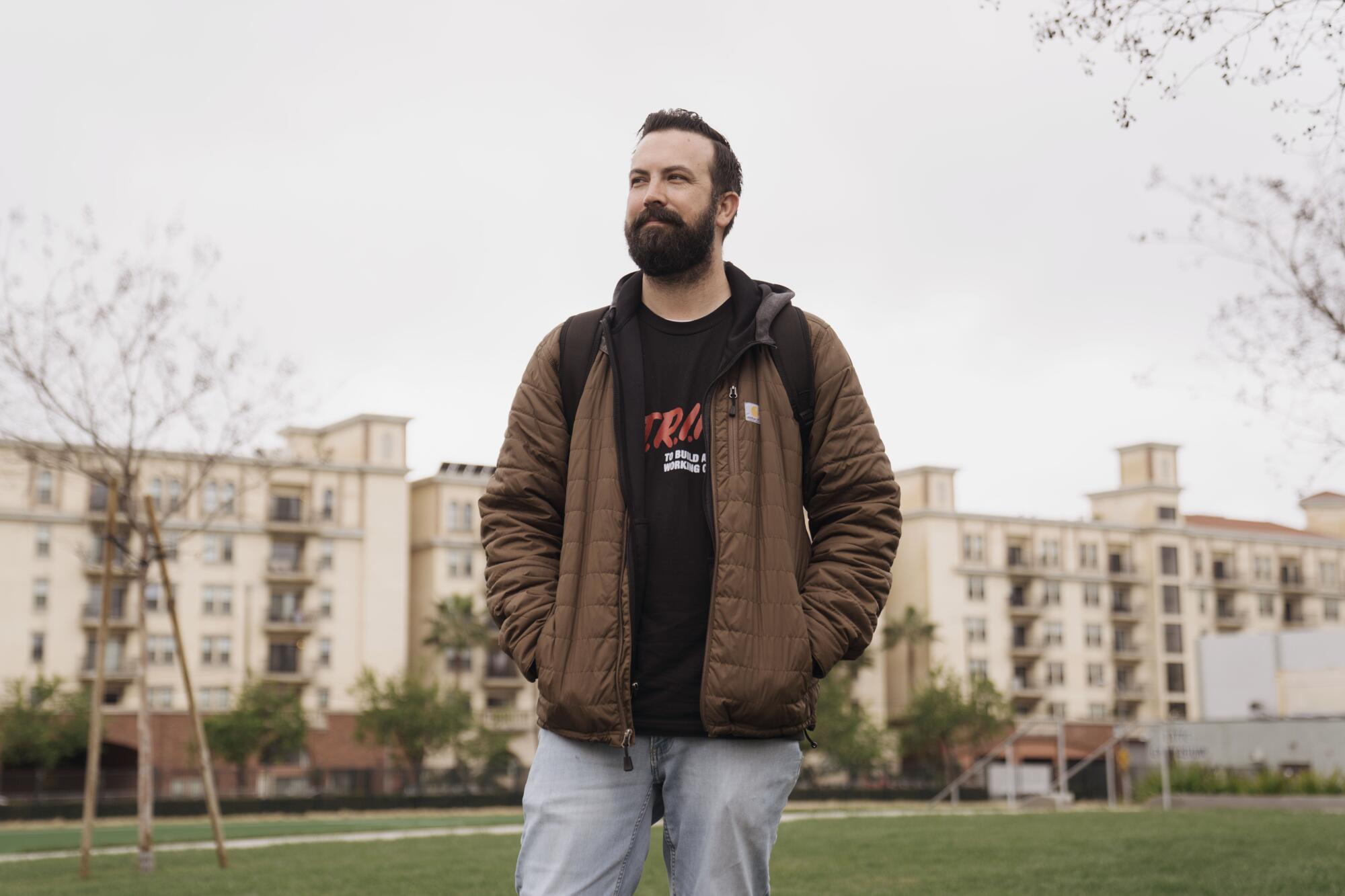
Like his father before him, Thomas Ham, 39, works out of a Communications Workers of America union hall in Colton, installing wires in homes and businesses.
“My dad supported my whole family on a single income,” Ham said. “I couldn’t do that today.” He is raising three children with his wife, a nurse, in Temecula.
Ham’s $41 hourly wage for Frontier Communications hasn’t kept up with inflation, and productivity pressures have amped up since the company’s highly leveraged $10.5-billion acquisition of Verizon’s telecom services in 2018. Bonuses were slashed and medical costs raised, he said.
“With Verizon, we did three to four jobs a day. With Frontier, they expect five to six — sometimes seven. The pay is not what it was, so a lot of people are quitting.”
Southern California’s CWA locals have dropped to fewer than 2,000 members from about 4,000 in the last six years, amid a corporate push to outsource jobs to nonunion contractors.
As Ham headed to a session on “What to Do When Your Union Breaks Your Heart,” he sported a button showing a coiled snake with the warning “Will Strike if Provoked.” But his union is less aggressive than he would like.
CWA leaders failed to engage their members as “the companies and the union started working hand in hand,” he said.
At Labor Notes’ Chicago convention, Ham, who is now Local 9588’s organizing chair, was inspired by Starbucks and Amazon workers who have launched independent unions, and by reformers who are transforming some traditional unions.
“Unions have gotten so stagnant, but now I have hopes that rank-and-file members are starting to take a stand,” he said.
Shine N Brite carwash is penalized over $900,000 for paying workers far below the minimum wage and denying them overtime and rest breaks, state officials said.
The warehouse worker
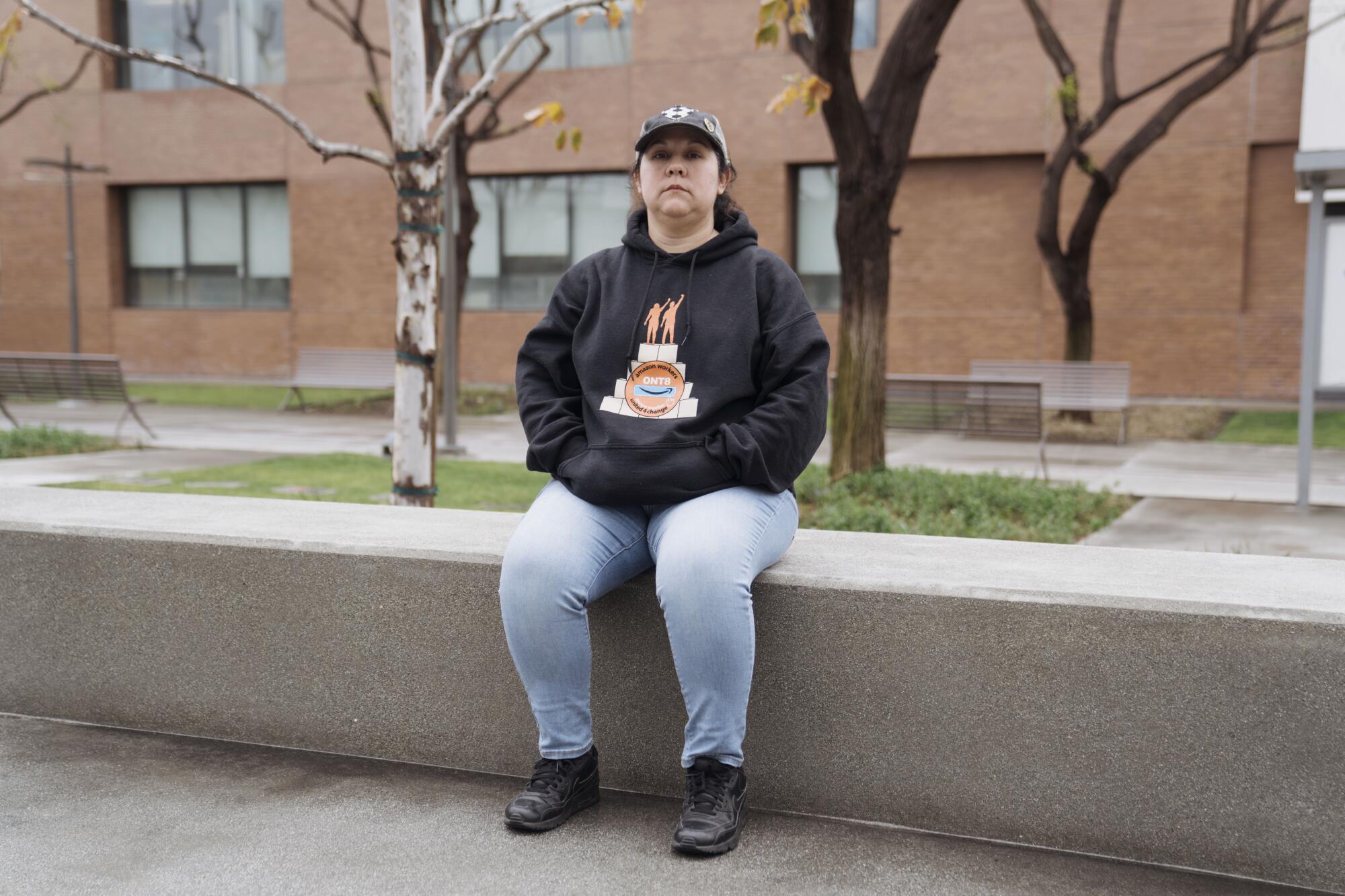
Nannette Plascencia, 44, has worked eight years packaging and labeling goods during 10-hour shifts at an Amazon warehouse in Moreno Valley.
“I’m a hard worker,” said the mother of three, who is married to a mechanic.
But in 2019, she was written up for “time off task” — an algorithm-generated measurement that penalized workers for taking restroom breaks or cleaning up a broken item.
“I was in shock,” she said. “I didn’t deserve it.”
Plascencia drafted a petition on unfair time-off-task discipline. Two hundred workers signed it, but management took no action, she said.
So began a rocky quest to unionize the 2,600-worker facility.
An Amazon spokesperson said the company has no record of the petition and no longer counts restroom breaks as time off task.
Plascencia approached Teamsters officials and was told to draft a new petition rather than embark on an uphill union battle — a strategy Teamsters are pursuing at Amazon’s air freight hub in San Bernardino where workers have staged brief walkouts.
“Petitions are a waste of time,” Plascencia told them.
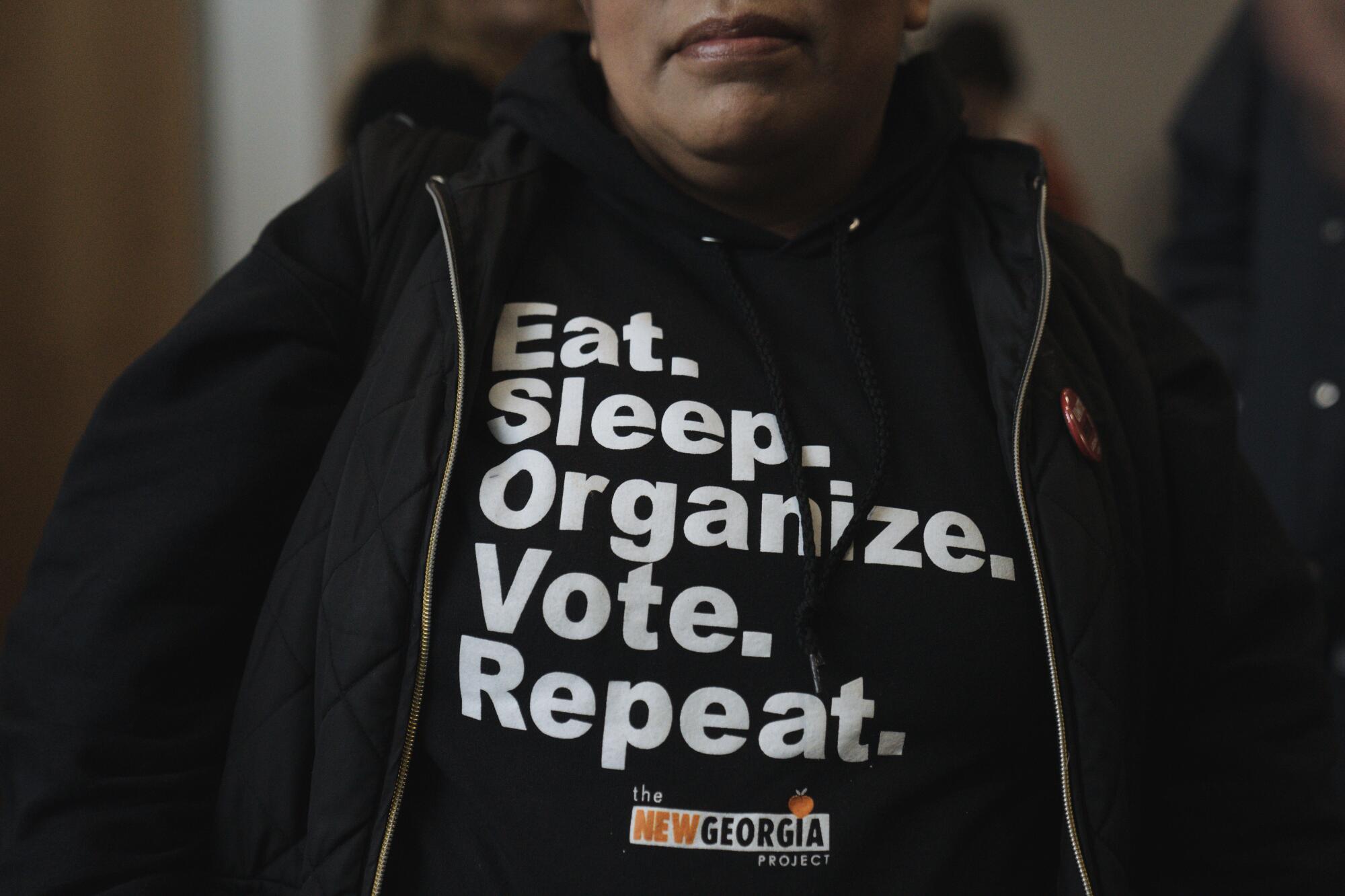
The Moreno Valley workers then turned to the fledgling Amazon Labor Union, which had garnered national attention for organizing a huge New York warehouse.
But in October, after filing an election petition with the National Labor Relations Board, they were forced to withdraw it when Amazon showed that signatures fell short of the 30% required for a vote.
Meanwhile anti-union consultants have descended on the warehouse, questioning workers at their stations and ordering them into captive audience meetings where, Plascencia said, they spread falsehoods about the union.
“Now some of my co-workers are scared,” she said.
Organizing is hampered by Amazon’s high turnover, and it hasn’t helped that leadership of the New York-based union is in turmoil over strategy after losing several recent elections.
On a Labor Notes panel, Plascencia urged other unions to join in taking on Amazon.
“I’m fighting Goliath,” she said. “I need more help.”
Trader Joe’s workers in Oakland are the first in California to file for a union election. They say the grocery chain has disregarded safety and prioritized profit.
The Starbucks organizer

Veronica Gonzalez, the daughter of a custodian who emigrated from Mexico, worked two jobs: at Dodger Stadium overseeing food service workers, and at a nearby Starbucks supervising baristas.
The contrast between the two workplaces is stark.
Unionized stadium employees made higher wages than the $22 an hour that Gonzalez, 27, earned at the Cypress Park Starbucks, and they were treated with respect, she said.
The Starbucks, where she has worked for five years, is “a monstrously busy drive-in with extremely overworked baristas.” Workers’ hours are irregular and the pay, between $16 and $19 an hour, is not enough to live on, Gonzalez said.
Especially galling is the abuse from unruly customers, as management “forces us to serve them,” she said.
In 2021, Gonzalez, inspired by Instagram posts on barista organizing in New York, reached out to co-workers. “People in unions have better benefits, better treatment — and a voice in the workplace,” she told them.
A Starbucks spokesperson said its baristas have “the best benefits in the industry” and the Cypress Park store is “appropriately staffed and scheduled to match customer demand.” The company offers “de-escalation and safety simulation training” to deal with unruly customers, he said.
But in August, the Cypress Park workers voted 21 to 2 to join Starbucks Workers United, an affiliate of the Service Employees International Union.
Starbucks has hired anti-union consultants, offered new benefits to nonunion workers and, according to the National Labor Relations Board, fired organizers — an accusation the company denies.
Of 9,300 corporate-run stores, about 300 have unionized so far. No collective bargaining agreements are approved. “The company keeps walking out on us,” Gonzalez said.
A Starbucks spokesperson said bargaining is interrupted when the union insists on hybrid sessions including offsite negotiators.
On a Troublemakers panel titled “Young Workers Rising,” Gonzalez said her union is “making sure people of color are at the forefront of this movement. We show young people if nothing changes, it’s only going to get worse.”
Progress may be slow, “but this is a multibillion-dollar company,” she said. “If you hyper-focus on how much power they have, you can fall into hopelessness.”
One bright spot: the “No Contract, No Coffee Pledge,” an online resource to update customers on local activism. “Showing up to support us on a picket line is a small ask,” she said. “But it makes a world of difference.”
More to Read
Inside the business of entertainment
The Wide Shot brings you news, analysis and insights on everything from streaming wars to production — and what it all means for the future.
You may occasionally receive promotional content from the Los Angeles Times.

